It would be so easy to be snobbish about Mamma Mia! Here We Go Again. It's a sequel to Mamma Mia!, the 2008 adaptation of the Broadway musical that crammed as many Abba songs as was physically possible into a plot about a young woman inviting her three potential fathers to her wedding on a lush Greek isle. It's trite. It's wide-eyed to an extreme degree. It's ridiculously over the top (it may be the most exuberantly happy film dealing with the loss of a parent I've ever seen). It has a timeline that makes no semblance of sense.
All fair points, yet I don't care about any of them. Here We Go Again is undeniably silly fluff, but it's also so spirited and lively that mounting a resistance to its charms would be an exercise in utter futility. To snobbishly resist also robs you of embracing the power of seeing a film like this in a theater full of women. I was surrounded by multiple generations of women- mothers with daughters, grandmothers with granddaughters-laughing and crying throughout the film, and it filled me with an overwhelming sense of elation.
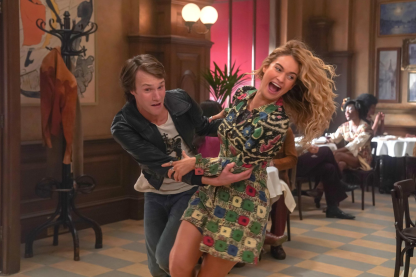
Here was a film in which the female characters evolve and shift, with the male characters only existing to support and gamely follow them. Its heart is so firmly planted in the right place that I can't feel anything but love for it. Yes, Here We Go Again is preposterous and exists purely to entertain. Yet, that only seems to be a problem if the movie is a "chick flick." If an action film consists of ever-increasing absurdist setups, it may not be critically lauded (although sometimes they are), but it doesn't seem to inspire the levels of contempt and vitriol that are sometimes directed towards films created for a female audience.
It's almost like male critics are quantifiably harder on women-led movies than they are on those with male leads. Oh, wait - they totally are! But I digress.
Here We Go Again builds upon the foundation left behind by the first Mamma Mia! and manages to ultimately improve on it. Director Ol Parker (who has the Best Exotic Marigold Hotel franchise to his credit) has constructed a sequel in which the choreography is crisper, the camera movement flashier, the humor a bit more knowing and the inherent silliness more fully embraced. Complaining that the film is brainless or that its timeline makes no sense seems reserved for the most curmudgeonly of film critics. It could be written off as a guilty pleasure, but if you've been swept along by the breathtakingly gorgeous Greek locales and story of mothers, daughters, and those who support them, you shouldn't feel any shame if the film's conclusion causes a few tears. Here We Go Again is a charming, flawless example of the kind of film it sets out to be.
We open five years after Mamma Mia! 's conclusion. Donna (Meryl Streep, appearing briefly) has passed away, leaving her husband Sam (Pierce Brosnan, singing far less than he did in the first film) and daughter Sophie (the effervescent Amanda Seyfried) on the fictional Greek isle of Kalokairi working to restore and repair her beloved hotel. Sophie has poured all of her focus into the hotel's grand reopening, but she's also dealing with other issues. She's estranged from her husband, Sky (Dominick Cooper) who feels she's trying to live Donna's life instead of forging her own identity. Making matters worse, her other two dads, Harry (Colin Firth) and Bill (Stellan Skarsgard) are unable to attend the reopening.
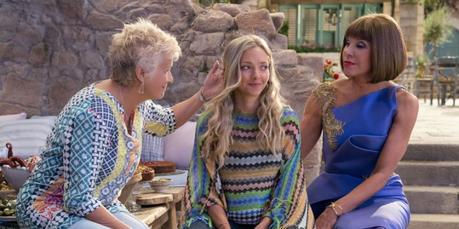
Luckily, Donna's closest friends, Tanya (Christine Baranski) and Rosie (Julie Walters) are ever-present to support Sophie. Joining them this time around is Andy Garcia as the hotel's new manager cryptically referred to as Senor Cienfuegos, with a first-name reveal that is both completely expected and delightful.
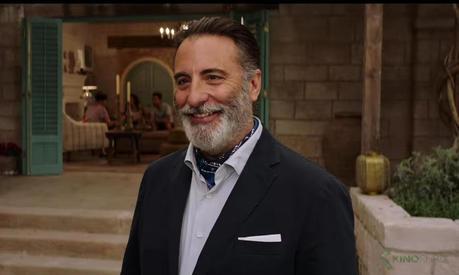
He's dealing with heartache of his own, and if you don't think that's an important plot point, you don't know what film you're watching. As if that wasn't enough, Cher also turns up, so what more could you ask for?
Like a musical Godfather, Part II, Here We Go Again intercuts Sophie's present-day attempts to figure out the life she really wants with Donna's quest to claim her own identity. Graduating from Oxford in 1979, Donna (Lily James) sets off across Europe, having those fated encounters with Harry (Hugh Skinner), Bill (Josh Dylan), and Sam (Jeremy Irvine) while choosing to make a life for herself on that idyllic Greek locale. Tanya and Rosie (their younger counterparts played by Jessica Keenan Wynn and Alexa Davies, respectively) are, of course, always there to stand by/sing with her.
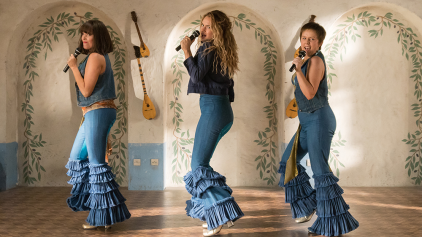
Here We Go Again has assembled a group of performers that are impossible to dislike. Our male supporting characters, both the present day and 1970s versions are appealing, but as with the first Mamma Mia it's the women who steal the show.Lily James is so absolutely charming and delightful, with a lovely natural singing voice, that if a cartoon bluebird landed on her shoulder and helped her croon "The Name of the Game" it would feel completely appropriate. It isn't difficult to believe Bill, Harry, and Sam would be so completely under her spell that they would happily return to a Greek island twenty years later in the hopes of seeing her again.

Baranski and Walters are as delightfully screwball as ever, and Keenan Wynn and Davies are equally entertaining. Then Cher shows up to be Cher, which feels like gloriously rich icing on an already decadent cake. Everyone seems to be having the times of their lives, even if singing, dancing, and jiving remain a bit beyond Firth, Skarsgard, and Brosnan. Sometimes a film in which its entire cast appears to be enjoying itself can feel a bit grating for an audience, but the giddy, barely-contained onscreen joy is absolutely contagious.
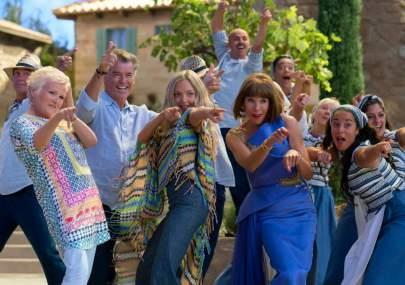
And then, of course, you have those Abba songs about flirtations, new love, and broken hearts. Mamma Mia! should have collapsed in on itself, especially when it decided to give Pierce Brosnan's croaky, nasally belt not just one but three (!) songs. Instead, the film revealed a truth about the simple brilliance of Abba's song catalog: their very core prevents them from being terrible. The songs are just too infectious, too perfectly catchy and well-crafted to be dismissed. Those perfectly constructed pop songs kept the film's world from careening off its axis.
Although it does eventually reuse "Dancing Queen" and "Mamma Mia," because why wouldn't you, Here We Go Again mostly pulls out deeper, but no less fantastic, cuts from Abba's catalog. Whether young Donna is singing "When I Kissed the Teacher" (to Bjorn Ulvaeus) or Hugh Skinner is proclaiming Donna will be his "Waterloo," (with Benny Anderson at a piano) the perfection of Ulvaeus's and Anderson's compositions is mind-blowing. These may be lesser known tracks, but they certainly aren't weaker. It's just nice they have a film more worthy of their inclusion. Even Brosnan fares better here, reprising a bit of his infamous "S.O.S.," that's now tinged with a heartbreak and melancholy that makes the rendition endearing and even moving.
There are lots of ways to end a review of Mamma Mia: Here We Go Again, but I'm in such a blissful state, I'm going to take my cue from the film and work in as many Abba references as I can. Therefore, if you "have a dream" to see Donna's "dancing queen" in all of her youthful glory and revel in Sophie's realization that she's following in her "Mamma Mia's" footsteps, "take a chance" and lay your "angel eyes" upon Here We Go Again. "Voulez-vous?" After all, it's "the name of the game." "When all is said and done," if we end up getting Mamma 3ia, I'll still "thank you for the music" and say "gimme, gimme!"

